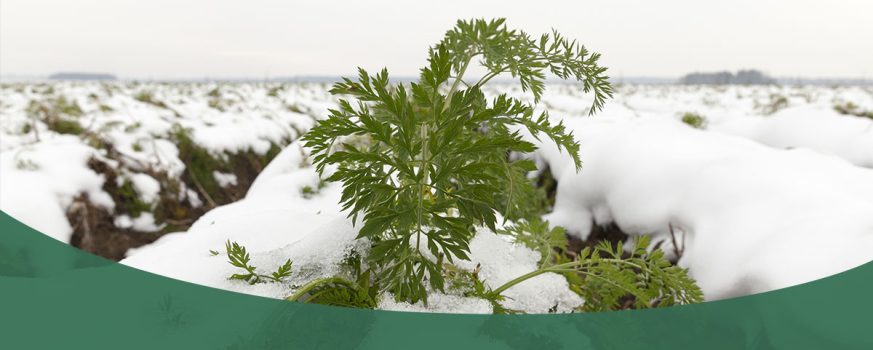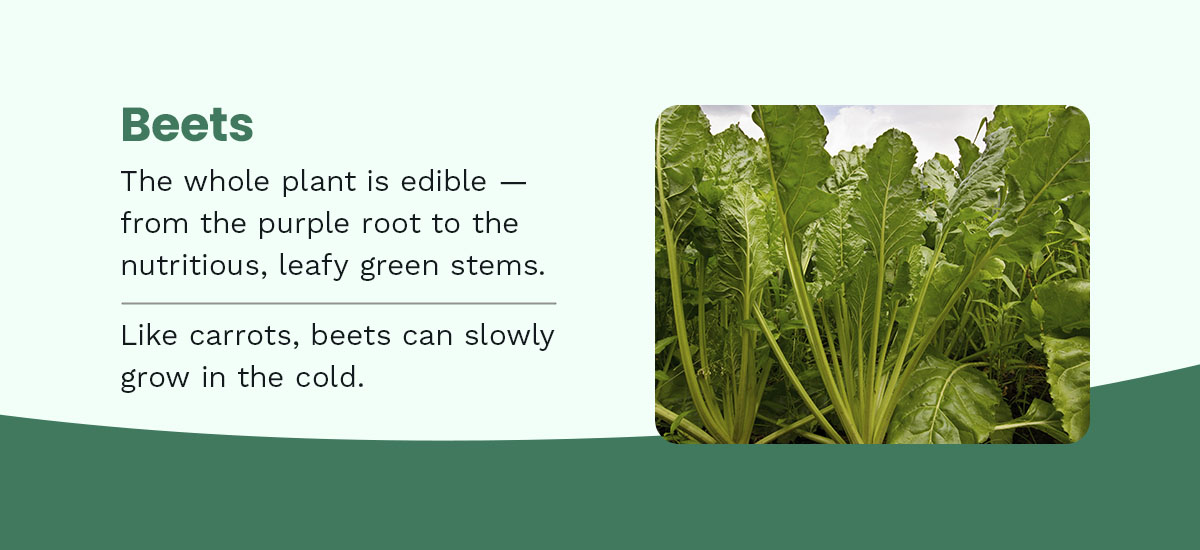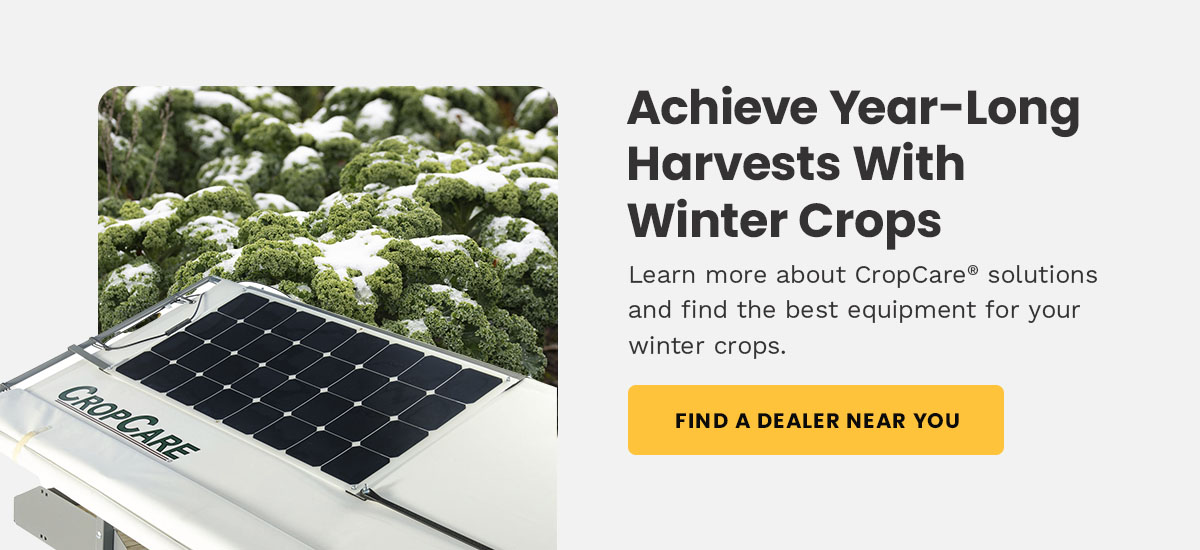
Winter growing is an excellent way to complement income from warm-weather crops, but you must choose plants that can withstand the cold and occasionally help them along. With a bit of planning, you can harvest crops year-round, including some that improve in the colder temperatures. Plus, the demands for weeding, watering and pest control are far easier to control.
We’ll explore some of the best crops you can plant in winter and how to find the right ones for your farm.
What Crops Grow in Winter?
Depending on your planting zone, you may have multiple crops to harvest in the winter. You must plant most of these when the weather is still warm, as they need to grow enough to withstand the frosts. Ensure your crop has enough time to mature by the frost date.
Cold-weather crops are usually semi-hardy or hardy varieties, which tolerate hard frosts well. Sturdy winter crops like broccoli and cauliflower can withstand temperatures as low as 24 to 28 degrees Fahrenheit, but many semi-hardy crops can take on light freezes of 28 to 32 degrees Fahrenheit.
While cold weather might not kill these crops, it can cause growth to slow down, so timing your planting is crucial. You may need to use season extenders such as hoop tunnels, frost blankets and soil insulation to keep temperatures from going lower than desired.
Here are some excellent crops you can grow in winter.
1. Kale
Many types of kale thrive in the winter. This crop and several others we’ll discuss can even improve after a few hard frosts. The cold temperatures cause some of the starch to convert to sugar, offering a sweeter taste. You can plant kale in spring, summer or fall, with fall plants producing baby kale in the winter.
Some hardy varieties include Winterbor, Red Russian, White Russian and Darkibor kale. Varieties with curly leaves are often hardier. If you have significant winter rain, try purple kale, which has the pigment anthocyanin and can better resist rotting from the rain.
2. Carrots
Try carrots for a sweeter winter harvest option. Like kale, they convert starches to sugars after a frost if the temperature doesn’t drop too low. Planting carrots in late summer gives them time to mature, and they can keep growing slowly throughout winter. You can wait to harvest in spring or winter, when many consumers want these colorful veggies for soup season.
You’ll need to keep the soil relatively warm with plastic covers or mulch. They work well in dense planting configurations. Look for varieties like Napoli, Mokum and Aranka.
3. Asian Greens
Many Asian greens — such as pac choi, mizuna, Chinese cabbage and tatsoi — do well in winter. They grow quickly and densely, offer plenty of variety and can keep producing yields. For most species, plant seeds in early fall.
4. Spinach
Spinach does particularly well in autumn and much of winter, especially with season extenders. It gets sweeter in cold weather and keeps producing leaves. It often has significant demand during cold weather, too.
Many spinach varieties need around two months of growth before the first frost. Consider options like Giant Winter, Space and Auroch. Sometimes, you can even resow spinach in winter for baby leaf harvests in early spring.
5. Beets
Beets are a colorful addition to winter crops. The whole plant is edible — from the purple root to the nutritious, leafy green stems. They’ll need around two months to mature before your fall frost and can only withstand light freezes. Like carrots, beets can slowly grow in the cold.
6. Arugula
Arugula does well in cooler temperatures, and some varieties have exceptional frost resistance. It’s also relatively heat tolerant, so it offers some flexibility. Seed arugula in early fall for a late autumn or winter harvest. This quick-growing winter crop comes in varieties like Astro and Rocket.
7. Herbs
Many herbs can keep producing yields into winter months with help. They often need milder winters or support from hoop tunnels, cloches, insulation and other warming methods. Still, you can create a year-round supply of herbs like:
- Parsley
- Thyme
- Chives
- Rosemary
- Sage
8. Other Winter Crops
These are just some of the plants you can grow in the winter. Other popular options include:
- Broccoli and cauliflower
- Brussels sprouts
- Mustard greens
- Cabbage and lettuce
- Peas
- Garlic
- Irish potatoes
- Winter squash
Tips for Growing Crops in the Winter
Since winter months hover close to dangerously cold temperatures, these crops often require extra attention. Remember these tips when growing crops in the winter.
- Add materials to keep temperatures warm enough: You may need season extenders and other warming systems to keep temperatures in the ideal range, especially if you’re in a lower zone like 4 or 5. Plastic mulch is a standard option, which also helps control weeds and conserve water through a plastic layer over the soil. Depending on the size of your farm, cloches or hoop tunnels may also work like mini, unheated greenhouses.
- Use your local extension office: Since frost dates vary widely, your extension office is often an excellent resource for learning more about the best times to plant. The staff can usually tell you about your region’s frost dates, and they may have more insight into the specific crop.
- Remember cover crops: Consider a hardy cover crop like cereal rye, hairy vetch or crimson clover in areas where you won’t plant anything in the winter. They can help improve the soil and get it ready for summer.
- Look for crop varieties with better cold tolerance: Within the crops we’ve discussed, some varieties respond better to the cold than others. If you live in a zone with colder temperatures, you may want to choose one of these hardier options.
- Know whether your crop does well as a transplant: In some cases, you may want to let your plant reach maturity before transplanting it into the soil, but some crops don’t transplant well. Research your crop’s affinity for transplanting before using this strategy.
- Be ready for the spring: If using season extenders, adjust or remove them quickly in the spring to avoid cooking the crops when the sun comes out.
Achieve Year-Long Harvests With Winter Crops
Extra support and planning can allow you to harvest crops long into the colder months. Try the above crops and tips for growing in the winter, and be ready to act fast if the forecast shows a fast swing in temperatures.
CropCare® has solutions to support your harvests during any season, with a wide range of sprayers, plastic mulch layers, picking assistants and more. Prepare your plants faster and more effectively to ramp up production and respond to changing temperatures. Find a dealer near you to learn more about CropCare® solutions and find the best equipment for your winter crops.



